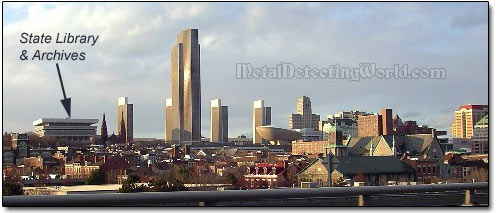Metal Detecting Research and Exploration - A Complete Guide, page 64
Other Forms of Research
OBTAINING LEADS FROM ARCHIVES, LIBRARIES, HISTORICAL SOCIETIES, COUNTY BOOKS AND the INTERNET
The Town, County or State library or State Archives are still the best source of old maps, history books, old newspapers, memoirs and diaries, school yearbooks and community celebration books. Today, besides books, you can obtain any historic document or old map transferred on microfilm, microfiche or its copy through the regional inter-library loan system that is computerized. You need to become familiar with the computerized setup at your library to search through classified catalogues and indexes.
Albany, New York

The internet has become another great source for books which you can easily read on line and download.
There are thousands of old and historic books that have been digitized and put out on the web, and sometimes finding the right document is a time-consuming process even when you use the search engines.
To shorten your searching time and to make sure you find a "golden" piece of information, try to come up with the best search phrase for the search engine.
Valuable documentation can be found in the National Archives, Library of Congress (Manuscript Section), the Historical Sections of the Department of Defense, the Interior, Justice and Agriculture.
On the state government level, documentation can be found in the secretary of state's archives, state treasurer's archives, state land offices' archives and state prison records.
On a county level, documents may be found in the archives of the county attorneys, clerks, surveyors, assessors and sheriffs. In city governments, old records can be found in the files or archives of mayors, city clerks, city engineers, libraries, city museums, police departments, street commissions and utilities offices. Private records of attorneys, bankers, businessmen, doctors and auctioneers can also furnish clues to finding a treasure.
Many rare and old historical books can be found in a small and antique book stores, annual library book sales, garage sales and, of course, on the Internet. The web has become a "gold mine" of historic information contained in thousands of digitized books and manuscripts that are readily available to public. Pay close attention to the academic publications (usually in PDF format) - master thesis, research and field work reports, essays, monograms and paper series, that focus not only on local history, but also on local toponymy, etimology, geography, etc.
College library and your community, county or state Historical Society also possess a good amount of local historical information, nothing to say about their special publications that might date back to the early 1900s. Genealogical books can help you track present day descendants of ancestors who owned the land involved in your research. As the world wide web is growing exponentially, you can find a great number of excellent genealogical web sites. Since people, both specialists and non-specialists in genealogy and history, who run them are doing their own research, the information they publish may contain some unique facts, and therefore, unique leads for your own research!
But do not buy some very expensive, "rare" book or map, touted to give you a "fabulous" lead. In all probability, if it is that good the person who owns it would not want to sell it. And more likely many people bought that book and followed that "fabulous" lead. Definitely stay away from so called "Treasure Atlases." They are good only for book collectors or armchair treasure hunters.